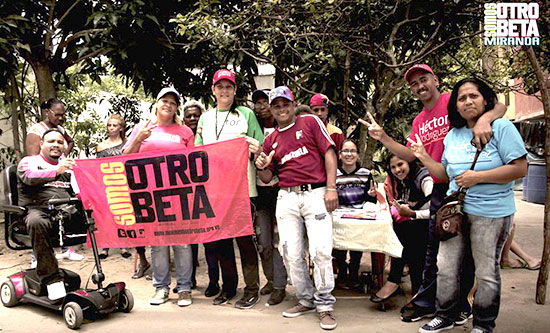
At the anti-imperialist conference in Havana (November 2019) delegates from the RCG and Rock Around the Blockade spoke with activists from Venezuela involved in the youth movement Movimiento Somos Otro Beta to find out how the Bolivarian Revolution supports young people. Since Chavez’s election in 1998 the Chavista movement has been building an alternative society and fighting for socialism against relentless economic, political and terrorist attacks undertaken by sections of the Venezuelan ruling class and their imperialist allies. Despite these crushing attacks, recently intensified by illegal sanctions (see FRFI 271), the Venezuelan government remains committed to directing revenue from state oil sales into housing, healthcare and education.
The Bolivarian Revolution has at its heart a drive to build popular participation and grassroots democracy, exemplified through the communal councils and communes. But the latest wave of brutal sanctions, imposed by the US and supported by Britain, has undermined state resources, propelling many organisations to become self sufficient in continuing the work of building revolutionary forces from the base.
Movimiento Somos Otro Beta was founded in 2011 through a collaboration of small youth organisations coming together as revolutionary Chavistas to promote social, political and cultural change in support of Chavez and the Bolivarian Revolution in the run up to the 2012 election. Started in Miranda state, the Otro Beta movement worked predominantly in the Petare slum, but has since built 5 further centres in Palo Verde, Los Teques, Valles del Tuy, Chichivirche de la Costa and Quibor, with two more planned to open in the states of Amazon and Aragua, making them active in eight provinces across Venezuela.
Their ethos is based on the principle of building revolutionary consciousness through working with some of the most economically disadvantaged Venezuelan youth living in barrios and relating the Bolivarian Revolution to their social and cultural realities. As George Ciccariello-Maher points out in Building the Commune, ‘barrio culture itself – which is rooted in a struggle against all odds – has plenty of revolutionary potential that [needs] only to be redirected… engaging revolutionary culture is a two-way street.’
Otro Beta focuses on education, production, communication and politics with a seven point programme:
- Organisation and politics: work is coordinated across neighbourhoods, schools, prisons and homes with the aim of politicising those who mainstream Chavism may not reach.
- Production: in line with the drive across Venezuela to increase self-sufficiency, the organisation offers courses in practical skills such as veterinary, robotics, computing and beauty. Those involved in the centre in Petare now produce the work uniforms for the Local Committees for Supply and Production (CLAP) workers in Caracas, while other centres provide products and services in areas such as food, hygiene and transportation. Although Otro Beta already had a commitment to increasing production, the blockade has forced this process to accelerate as sanctions are imposed on those trading with Venezuela in a bid to strangle the economy and force the Bolivarian Revolution into submission.
- Sports and recreation: the centres organise inter-barrio sports tournaments and have repaired 52 facilities, including sports grounds, for the use of the barrio youth. Operating in areas where local gangs are active and working to establish cease-fires between them means providing alternate sources of collective activities, such as sports tournaments, as part of the process of building community cohesion.
- Culture and arts: the centres offer dance and arts classes and the movement has built seven recording studios for the barrio youth to use. They organise rap and hip-hop concerts, not only providing entertainment but also acting as opportunities for young people to gain experience in music production and event management. Their initiative ‘Culture is in the Barrio’ is aimed at incorporating the Barrios into mainstream Chavism.
- Information: Otro Beta doesn’t see its role as being to educate from the top down, but seeks to help reform and revolutionise ideas of young people by relating their lived experiences to the broader political struggle.
- Exploratory investigations: one of its first major projects was a census of the youth in Petare to assess how they identified themselves and therefore how the movement could relate to them.
- Communication: there is constant dialogue between the Otro Beta organisers and the young people to ensure the movement is truly reflective of their voices.
Although not a commune, they work to build community organisation on a local level with the aim of uniting people across the states they are active in. Otro Beta also forms part of ALBA Movimiento, a project bringing together social organisations from across Latin America united in their fight against imperialism and commitment to building socialism.
The media war being waged against Venezuela paints a fabricated portrait of the Venezuelan youth being failed by their government; a top down autocratic state robbing them of opportunities and denying them their aspirations. Movements like Otro Beta, and like the government’s ‘Chamba Juvenil’ project aimed at integrating hundreds of thousands of young people into employment and education opportunities, are omitted from the narrative. These movements highlight the dedication of the Bolivarian Revolution in supporting and advancing young people, from both the state level and grassroots organising, as part of the Chavista struggle to construct a society that can meet the needs of the mass of people. That these efforts are continuing in the face of threats of war, terrorist attacks and an economic blockade stands to show what a society committed to its people can achieve.
Ria Aibhilin




